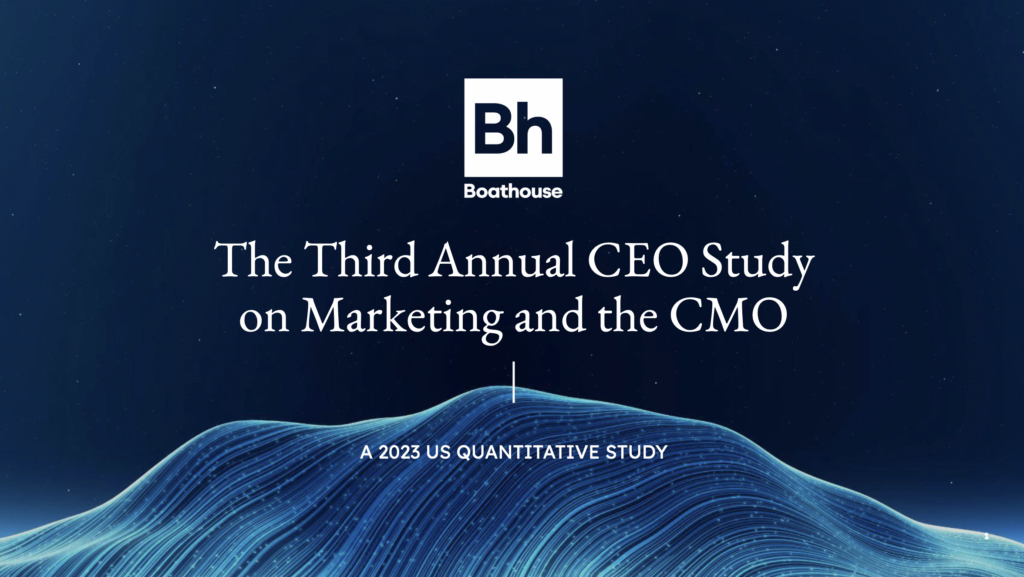
According to Boathouse’s third annual “CEO Survey on Marketing and the CMO” published this week, CEOs’ perception of CMO performance and marketing is shifting to a more favorable one. For instance, the study, which polled 150 CEOs from U.S. public and private companies across 17 industries, shows that 51 percent of CEOs now believe the CMO’s short tenure is a sign of success in their role rather than failure—up from 20 percent in 2021’s survey. Moreover, compared to 2021, nearly double the amount of CEOs rated their marketing and CMO “best in class.”
Below are the survey’s key insights—including CEOs’ viewpoint on marketing, the level of trust between CEOs and CMOs and perspectives on AI—followed by a chat with Boathouse CEO John Connors about the most critical and surprising revelations from the report.
C-Suite Perspectives
CEOs Views on Marketing and the CMO
- CEO respondents indicated that they want marketing to drive growth in five core ways: customer expansion, sales/market share, competitive differentiation, improving brand/reputation and transforming the company narrative in the marketplace.
- 49 percent of CEOs rate their marketing’s capability as “best in class,” up from 20 percent in 2021. Respondents rated 40 percent of CMOs as “best in class.”
- Half of CEOs now believe the CMO’s short tenure is a sign of success in the role rather than failure, which is up from 20 percent in the survey’s earlier editions.
- In 2023, CEOs scored their CMOs higher across these areas of responsibility within marketing:
- Scored highest: Relationship/trust between the C-Suite and CEO (43 percent)
- Sharpest Increase: Innovation and generating new ideas (38 percent versus 19 percent)
- Scored lowest: Strategy (31 percent in 2023 and 16 percent in 2022)
- 71 percent of CEOs view their company’s brand and their reputation as the same thing, versus 29 percent that think they are different.
Trust Between CEOs and CMOs
- CEOs’ perception of CMO loyalty is growing: 8 in 10 CEOs perceive CMOs would “take a bullet for them,” which is up from 3 in 10 in 2021.
- However, in 2023, CEOs believe that personal loyalty has been replaced by company loyalty.
- Only 9 percent of CEOs say CMOs are more loyal to the CEO (compared to 27 percent in 2022), versus 51 percent to the company (34 percent in 2022).
Business and Financial Goal Setting
- In 2023, CEOs said that 77 percent of CMOs understood the company’s board and political dynamic, up from 2021.
- When evaluating CMO understanding of the P&L and participation in financial goal CEOs views fluctuated from 2023 to 2021: 69 percent of CMOs understand the P&L and the balance sheet, up from 53 percent in 2021. But only half of CMOs participate in financial goal setting, down from 73 percent in 2021.
- The top five issues “increasing in importance” to CEO decision-making are linked to financial performance, while CSR, DEI, employees and ESG have taken a step back in comparison to 2021. AI, security/privacy and cost cutting are now part of the top issues in importance.
- CEOs say that workforce issues, employee recruiting and DEI are declining in importance—41 percent less than December 2021.
C-Suite and AI
- 76 percent of CEOs are integrating A.I. into their organizations.
- In terms of departments, marketing has the broadest AI adoption, while IT, Product Development and Operations are the most mission-critical.
- 58 percent of CEOs say their CMOs have made A.I. presentations, asked for funding or created new processes using A.I.
- AI integration in marketing is most predominant in content (generation/personalization) and analytics (about two-thirds) and customer experience or research (half).
Q&A With Boathouse CEO John Connors
Chief Marketer: What surprised you about the report’s findings?

John Connors, Founder and CEO at Boathouse: A few things on the surprising side. Before we even jump into the CMO pieces, the way CEOs have given up on diversity, DEI and employees was alarming and depressing. We started the study specifically to help CMOs related to the tenure issues they have faced, so it wasn’t our intention to point out the fickle nature of CEOs. But I think we’re now starting to see that as well.
Two, I was happy to see the turnaround with CMO perception, because we’ve had a couple years of more middle-of-the-road, negative results. And to see the bounce back is really encouraging. Because as an agency, I work for CMOs. So if CMOs are trending low, it means I trend lower.
The third one would be the lack of personal trust between CEOs and CMOs. There’s still an interesting opportunity gap there. And then a fourth would be that CEOs see brand and reputation as the same thing. They are very distinct issues from an academic marketing standpoint, but CEOs are putting them all in one bundle.
CM: What’s your advice for CMOs in light of these findings?
JC: All three years, we asked about issues and audiences of importance to the CEO, because I think CMOs should spend more time making sure they’re tracking to the issues and audiences that are most important to their CEO, almost as a discipline. CMOs don’t think twice about doing research around the consumer. But they don’t do that much research on their own C-suite sometimes. Be a little more disciplined about tracking the audiences and the issues that are most relevant to the CEO, and don’t walk in and always say, “it’s all about the consumer.” Because if you do that, and the consumer’s not at the top of the CEO’s list right now, you become less credible. Then part two, to your point, is building that personal trust and really working on that.
CM: It was interesting to see that there’s more confidence in CMOs, but that the trust has shifted more to the company as opposed to the personal relationship between the CMO and the CEO.
JC: I agree. My instinct is that they built trust together over the last few years with COVID. CMOs weren’t used to worrying about supply chain, employee, etc., etc. But they had to get some religion because that was sweeping every company. I think they built more structural alignment there, but there’s still some more personal alignment to be had.
CM: Why do you think CEOs see CMO short-term tenure as a sign of success?
JC: It’s a really surprising data piece to me, because it was perceived as failure in each of the last two years. I want to see what happens two and three years out [regarding] this question, and whether the trend continues or it’s an anomaly. But I think as you begin to trust this person more, you begin to assign movement to success and less movements to failure. We haven’t achieved personal trust, but we’ve achieved professional trust. That’s my theory, but I have to wait another year or two until I see the pattern in the data.
The post Boathouse Survey: CEO Perception of CMO Performance and Marketing Is Improving appeared first on Chief Marketer.




















